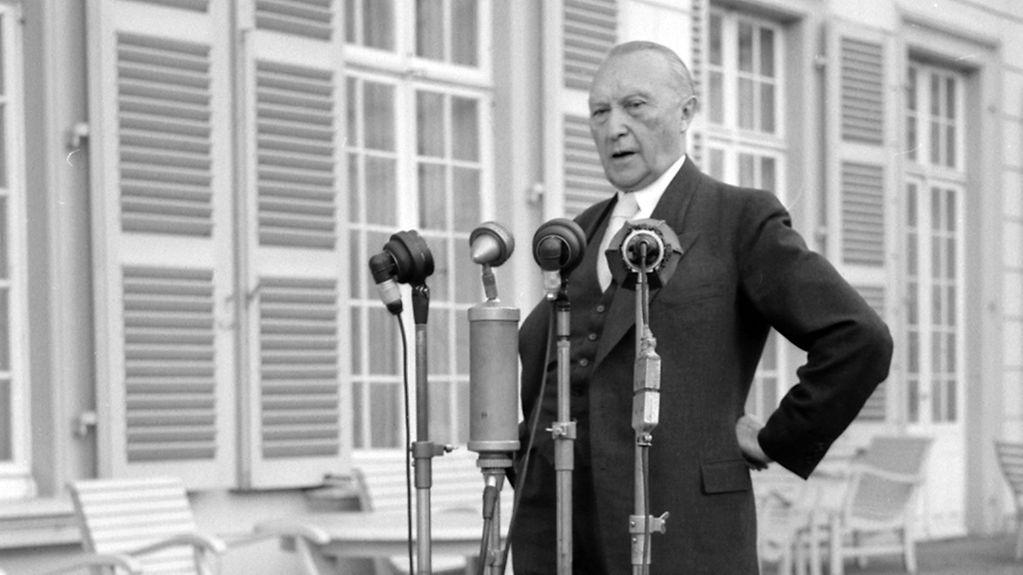The most famous German politician after the World War II: Who is Konrad Adenauer?
In the first elections held in 1949, Adenauer was elected prime minister. He continued his duty as prime minister by obtaining the majority in 1953, 1957, and 1961 elections. He worked hard for Germany to join NATO.

(1876-1967) German politician. He played an important role in the founding of the Federal Republic of Germany and served as prime minister from 1949 to 1962. He was born on 5 January 1876 in Cologne and died on 19 April 1967 in Rhöndorf. He is the son of a wealthy Rhineland family. His father was a civil servant. He studied law and political science at the universities of Freiburg, Munich, and Bonn. He started working for a well-known lawyer who was one of the local leaders of the Center Party in Cologne. Founded by German Catholics, the Center Party was the most influential political force around Cologne. Adenauer, who took part in this party, soon became one of the leading figures of the party. He was elected to the Cologne City Council in 1906 and became mayor in 1917. In 1920 he was elected to the Prussian Council of State. He became chairman of the council in 1928. He was dismissed by the Nazis in 1933 and was arrested twice between 1933 and 1934.
After the end of World War II, Germany came under the military control of the United States, France, Britain, and the Soviet Union. Adenauer became mayor of Cologne again at the request of the American military forces. He was dismissed by the British military administrator on the grounds that he was politically incompetent, just as he was about to begin the repair of the city destroyed by the bombardment.
Meanwhile, he was among the founders of the Christian Democratic Union, which was working on organizing. This party, in which Protestants and Catholics united by putting aside their sectarian differences, aimed to represent the Christian thought in the government and was supported by the Catholic Church and German business circles. The party soon began to gain strength in Allied-controlled areas. Adenauer became head of the party's local organization in 1945, head of the British District in 1946, and chairman in 1949.
As a result of the differences of opinion between the Soviet Union and the other three allies, when the Soviet Union left the joint administration, the USA, France, and England decided to establish the German Republic in their own regions. Adenauer was appointed as the chairman of the Constituent Assembly and participated in the work of the temporary constitution for the federal republic to be established. In the first elections held in 1949, the Christian Democratic Union won a majority and Adenauer was elected prime minister. He continued his duty as prime minister by obtaining the majority in 1953, 1957, and 1961 elections.
Adenauer's political views were influenced by Catholic teaching. He was against socialism. He opposed the concept of an "egalitarian society", arguing that "legitimate leadership" could not emerge. The social structure he advocated was towards the development of individualism under the control of the law. The state should provide citizens with all possibilities for their independent intellectual and economic development under the protection of the law.
He advocated liberalism in the economic field and opposed state intervention. Adenauer's personal views did not exactly coincide with the party program. When the contradiction arose, Adenauer, both as party leader and member of the government, preferred to retreat and not be intrusive. He thought that this was necessary to ensure the unity of the country and to put Germany in a strong place in Europe.
Adenauer, who also assumed the foreign ministry, played an active role, especially in foreign relations. He saw the development of socialism in Europe as a real threat to the Western world and its values. He said that peaceful coexistence with the socialist system could not be lived, and argued that it was necessary to be prepared for any military attack from there.
He worked hard for Germany to join NATO. He also deemed it necessary to establish a European defense organization. He pursued a policy of reconciliation with western countries in order to bring Germany into the European Union with equal rights while ensuring its economic development on the one hand, and re-establishing its army on the other. He especially established good relations with French President de Gaulle and US Secretary of State John Foster Dulles.
He resigned in 1962 as he got older. Minister of Economy Ludwig Erhard, who is known as the person who realized the German “economic miracle” after World War II, assumed the post of Prime Minister. Adenauer, who also resigned as party chairman in 1966, died a year later.
